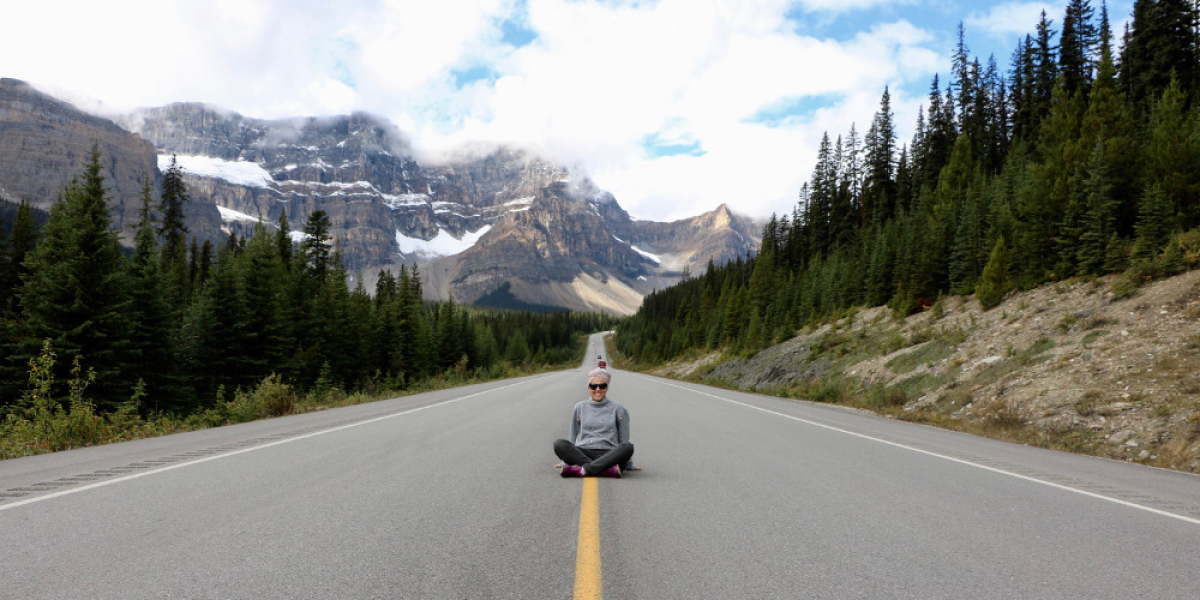
Ferdy grew up in Paris. Seizing an opportunity abroad, she flew to Morocco where she spent two years before moving to Canada to be with her husband, who was a university student. Both decided to live in Quebec before they realised that Canada has more to offer. Their quest for a better life lead them to Edmonton in Alberta province.
Where are you from, what are you doing in Canada and what were you doing before you arrived?
I'm French, and I grew up in Paris. Upon completing my studies, I moved to Casablanca, Morocco, where a German multinational company hired me. I spent two years in Morocco before joining my student husband in Canada. In September 2012, I landed in Montreal, a vibrant student city. I took some English classes to have better chances of finding a job, I made a couple of friends and made the best of my stay in Montreal for a year and a half.
What brought you to Edmonton?
We heard a lot about the West and especially about Alberta's thriving economy while we lived in Montreal. Career prospects and living standards seemed attractive. We tried hard to find a job in our field of expertise in Montreal, but without a success. My husband then decided to explore Alberta (Calgary, Edmonton, Fort McMurray) for a whole month. We finally chose Edmonton for its quality of life. In ten days, we packed up everything and said goodbye to Montreal to start all over again in Edmonton in March 2014.
What is your favourite thing about Edmonton, and what is your least favourite thing?
I really like Edmonton's location, halfway between Banff and Jasper, the two most popular Rocky Mountain cities. In fact, we just go out and explore the area whenever we can. However, Edmonton is a small city where you can easily get bored depending on the season.

How would you describe Edmonton in one sentence?
A small developing city, Edmonton is the ideal place for family life.
What has surprised you the most about Edmonton?
I've always lived in big cities while Edmonton has just about one million inhabitants. Coming from Montreal, Edmonton seemed quite empty to me. You randomly see people in the streets.
How easy or difficult it is to find accommodation in Edmonton?
It's rather difficult to find quality housing in Canada in general. You could really need a bucket of money if you're looking for a clean and modern apartment. For a one-bedroom apartment, for example, expect a $1,300 to $1,400 monthly rent. You should seriously take your time and compare prices as these are likely to rise and fall anytime. However, you can still find cheaper accommodation in some areas if you're lucky enough. Edmonton's best neighborhoods are in the West and South. If you don't have a car, you should rather live closer to the city center or a tram station.
What are the year's biggest holidays in Edmonton?
As Alberta is an English-speaking province, Edmonton, its capital city, can boast about having a multicultural environment, so there's always something happening. The Heritage Festival and the Edmonton International Fringe Theather Festival, which is the major and oldest art festival in North America.
How do you find the lifestyle in Edmonton?
It's very simple and family-orientated. People work a lot and are heavy consumers, which is typically American. Also, people in Alberta tend to want everything big: be it their house or pickup, quads or a caravan for the summer days.

How is the transportation system in Edmonton?
We have buses and the tram in Edmonton – even though I solely use my car. It's almost essential to have a car in Edmonton as the bus network is not so efficient. While a car trip can take you ten minutes, count about one hour and a half by bus.
Have you been able to adapt to Edmonton and the society there?
Moving to Alberta meant choosing a different system from that of Quebec. Given that Alberta is an English-speaking province, there are significant differences between the two. You have the impression that Canada is a whole continent where each province is a country on its own – perhaps due to the Federal government. However, it does not take long to adapt to new local regulations. I would even say that the English-speaking system is much simpler.
How is everyday life for you in Edmonton?
We work 40 hours a week. People usually get up quite early in Alberta, so you can be at the office around 6.30 am or 7 am. Actually, my working schedule allows me to enjoy the rest of the day as from 3 pm. After work, I can go to the gym, do some shopping or go to the coffee shop with my friends. I'm back home around 6 pm to make dinner and relax, and this really adds a lot to the quality of life we enjoy here as opposed to Montreal or Toronto where you can be stuck in the traffic for hours.
What do you do in your free time?
I read a lot of books and blogs. I also spend a lot of time on my blog where I share my adventures and my favorite things about Canada. We also enjoy camping so we go for a whole weekend whenever we can. I also like photography and I've just started making videos.

Are there activities for people who enjoy nightlife?
I bet there are, but I've never been a fan of nightlife so I cannot say much about it.
What new habits have you developed in Edmonton? And what old habits have you quit?
Here I can go to the bank, the post office and the drug store at night or in the weekend. I really like that everything is open even on Sundays! Also, I get up earlier nowadays – I'm already up at 5.30 am – and I eat healthier than I used to do in France or in Morocco.
On the other side, I only travel by car nowadays, so I walk less and have to go to the gym for some exercise. On top of that, we don't eat bread regularly anymore even though we can get some nice baguettes at a nearby bakery.
What is your opinion on the cost of living in Edmonton?
The cost of living is quite high in Edmonton but the average wage is also higher than in the rest of the country. For a bus trip, you need $ 3.25 and $ 5.50 for a beer. A loaf of bread costs nearly $ 3.
What is something that you would like to do in Edmonton but haven't had the opportunity to do yet?
I really wish to see more of this beautiful country by making road trips in the North-west through Yukon and discover the maritime provinces. I would also like to make a train trip across Canada, see polar bears in Churchill, Manitoba, dive along with beluga whales and go trekking in the West Coast of British Columbia.

Share your most memorable experience in Edmonton.
Without hesitation: our first Heritage Festival! We had a great time at the Hawrelak Park discovering world cultures through their music, dance and food. It was really amazing. It's a yearly festival that is held in August's long weekend.
What do you think of the local cuisine? What are your favourite dishes?
Canada does not really have a particular cuisine, but we have adapted our eating habits to the local way of doing things. I cannot do without peanut butter and oatmeal anymore. Canada is a nation of immigrants where you have as many cuisines as nationalities – some 150! I have never tried so many cuisines in my life. The Heritage Festival is without a doubt the best moment to discover all these cuisines.
What do you miss the most about your home country?
My family and friends, of course, and the French gastronomy.

Give us some useful tips that soon-to-be expatriates in Canada will benefit from.
Moving anywhere in the world is never an easy process. You often have to give up your old habits and be prepared to face all types of challenges – which is a normal thing. The first year always seems difficult, but once you get used to it, you'll be alright. Besides, Canada has so many hidden gems that you would probably like to explore.
If you had to advise an expat on five items to bring with them to Canada, what would they be?
A nice camera since Canada has such an amazing landscape. You should also bring a couple of things that will make you feel at home once you've settled.
What are your plans for the future?
We don't know yet, but we still have to see more of Canada, so we're not likely to leave anytime soon.
What is one thing that you will take with you from Canada?
A nice traditional wooden canoe.



















